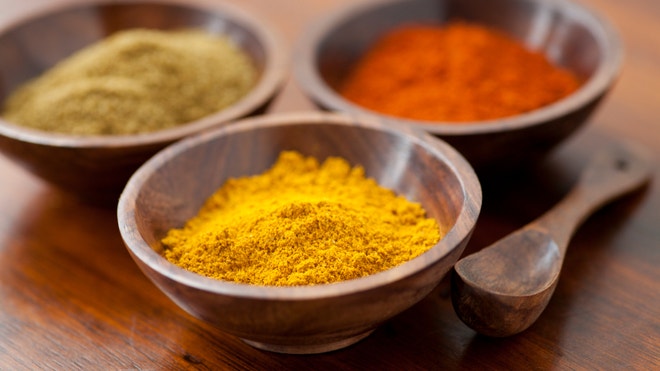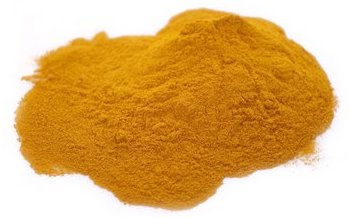
“Anticancer potential of curcumin: preclinical and clinical studies.” http://www.ncbi.nlm.nih.gov/pubmed/12680238
“Tetrahydrocurcumin is more effective than curcumin in preventing… colon carcinogenesis. Tetrahydrocurcumin (THC), a major metabolite of curcumin (CUR), has been demonstrated to be anti-cancerogenic and anti-angiogenic…these results demonstrated for the first time the in vivo chemopreventive efficacy and molecular mechanisms of dietary THC…” http://www.ncbi.nlm.nih.gov/pubmed/21887819
“Tetrahydrocurcumin inhibits HT1080 cell migration and invasion via downregulation of MMPs and uPA.” http://www.ncbi.nlm.nih.gov/pubmed/18565284
“Plant-derived anticancer agents – curcumin in cancer prevention and treatment.” http://www.ncbi.nlm.nih.gov/pubmed/23700916
“Anti-cancer and anti-angiogenic effects of curcumin and tetrahydrocurcumin on implanted hepatocellular carcinoma in nude mice” http://www.ncbi.nlm.nih.gov/pmc/articles/PMC2701520/
“Mechanisms of cancer chemoprevention by curcumin.” http://www.ncbi.nlm.nih.gov/pubmed/11370761
“Tetrahydrocurcumin, a major metabolite of curcumin, induced autophagic cell death through coordinative modulation of PI3K/Akt-mTOR and MAPK signaling pathways in human leukemia HL-60 cells.” http://www.ncbi.nlm.nih.gov/pubmed/21928294
“Synergistic anticancer activity of curcumin and catechin: an in vitro study using human cancer cell lines.” http://www.ncbi.nlm.nih.gov/pubmed/21780253
“Synergistic anticancer effects of curcumin and resveratrol in Hepa1-6 hepatocellular carcinoma cells.” http://www.ncbi.nlm.nih.gov/pubmed/23446753
“Curcumin enhances the anticancer effects of trichostatin a in breast cancer cells.” http://www.ncbi.nlm.nih.gov/pubmed/22290509
“Curcumin polymers as anticancer conjugates.” http://www.ncbi.nlm.nih.gov/pubmed/20591475
“Curcumin Potentiates The Ability of Sunitinib to Eliminate the VHL-lacking Renal Cancer Cells 786-O: Rapid Inhibition of Rb Phosphorylation as a Preamble to Cyclin D1 Inhibition.” http://www.ncbi.nlm.nih.gov/pubmed/23848205
“RL66 a second-generation curcumin analog has potent in vivo and in vitro anticancer activity in ER‑negative breast cancer models.” http://www.ncbi.nlm.nih.gov/pubmed/22971638
“ApoE3 mediated polymeric nanoparticles containing curcumin: apoptosis induced in vitro anticancer activity against neuroblastoma cells.” http://www.ncbi.nlm.nih.gov/pubmed/22890189
“Inclusion complex of novel curcumin analogue CDF and β-cyclodextrin (1:2) and its enhanced in vivo anticancer activity against pancreatic cancer.” http://www.ncbi.nlm.nih.gov/pubmed/22322899
“Water-soluble antioxidants improve the antioxidant and anticancer activity of low concentrations of curcumin in human leukemia cells.” http://www.ncbi.nlm.nih.gov/pubmed/15700780
“Superior anticancer efficacy of curcumin-loaded nanoparticles against lung cancer.” http://www.ncbi.nlm.nih.gov/pubmed/23786839
“Dose-escalation and pharmacokinetic study of nanoparticle curcumin, a potential anticancer agent with improved bioavailability, in healthy human volunteers.” http://www.ncbi.nlm.nih.gov/pubmed/21603867
“Apigenin shows synergistic anticancer activity with curcumin by binding at different sites of tubulin.” http://www.ncbi.nlm.nih.gov/pubmed/23485682
“Anticancer and carcinogenic properties of curcumin: considerations for its clinical development as a cancer chemopreventive and chemotherapeutic agent.” http://www.ncbi.nlm.nih.gov/pubmed/18496811
“Curcumin-free turmeric exhibits anti-inflammatory and anticancer activities: Identification of novel components of turmeric.” http://www.ncbi.nlm.nih.gov/pubmed/23847105
“Perspectives on new synthetic curcumin analogs and their potential anticancer properties.” http://www.ncbi.nlm.nih.gov/pubmed/23116312
“Synthesis and evaluation of curcumin-related compounds for anticancer activity.” http://www.ncbi.nlm.nih.gov/pubmed/22551677
“Curcumin and its analogues: potential anticancer agents.” http://www.ncbi.nlm.nih.gov/pubmed/20027668

